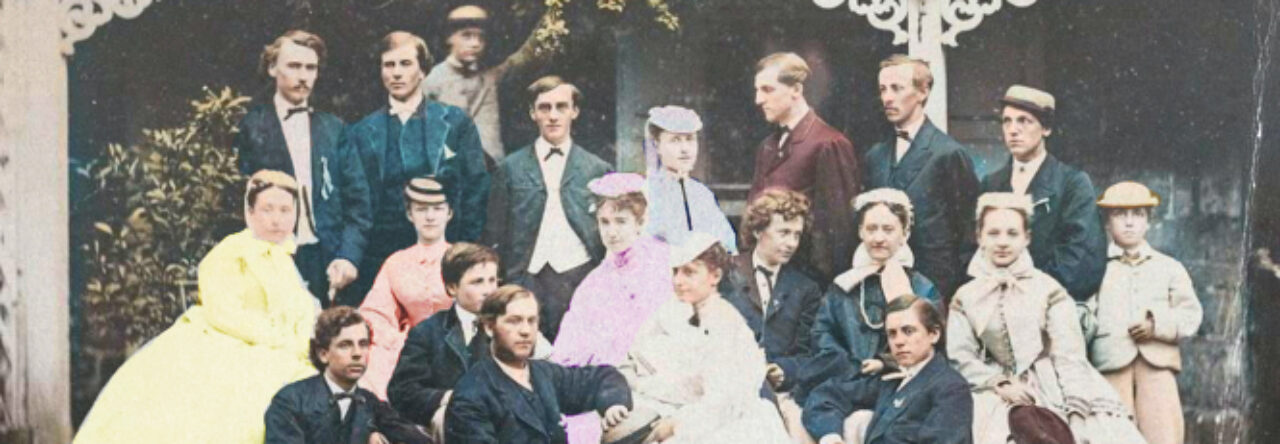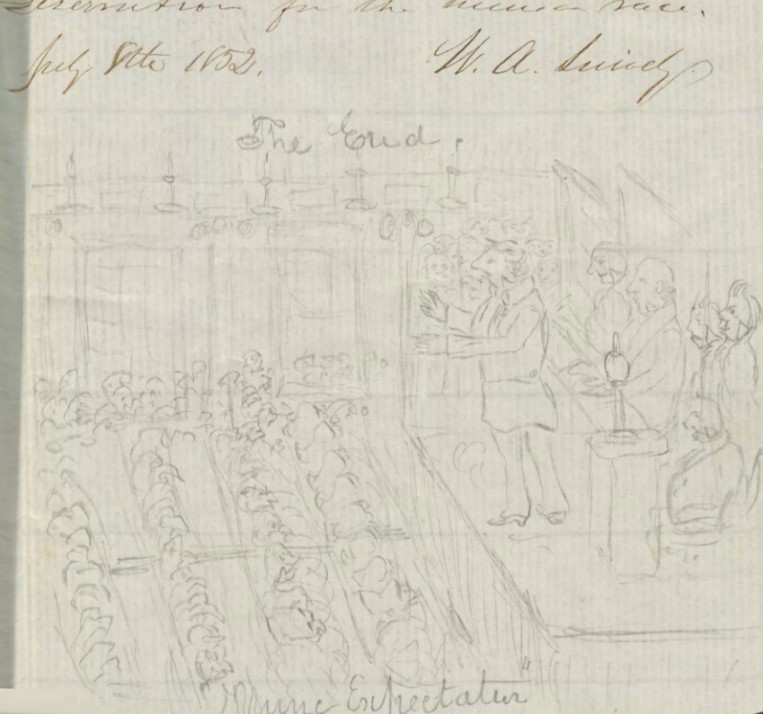Collections Search
While researching for information about Dickinson College Class of 1852, the Dickinson College Archives & Special Collections was an excellent resource. In order to find more information about my class I started online, using the college archives website. These list were honestly less helpful than I was hoping. Due to the overwhelming number of pictures, letters, diaries, newspapers, speeches and numerous other items I was, at first, unsure of where exactly to take my search. My class is relatively big, 21 graduates and 34 non-graduates, but there isn’t any one figure that stands out above the rest such as a head of the Smithsonian or the President of the United States. Based on previous research, one area that sparked interest for me was social involvement. Although I did not really know how to find relevant information on such a topic College Archivist James Gerencser and Special Collections Librarian Melinda Doran were extremely helpful. In the first class I had in the archives I was presented with a commencement address written by one of the graduating members of my class, John McCarty. When I first looked over the original copy of John McCarty’s commencement speech I thought that this speech was some sort of graduation address, as they are now. However, during another class in the archives classroom, college archivist James Gerencser informed me, “during this time period every student needed to write a speech, almost like a senior thesis, in order to graduate.” Using finding aides in the archives I was later able to locate more of these commencement speeches. After further research I found that there were in fact 10 speeches in the archives, all in remarkably good condition. These documents provided me with plenty of relevant information about the class of 1852.
Document Identification
The teachable items that I found at the archives all stem from the first archive that I saw from the class of 1852, a commencement speech by John McCarty. Using McCarty’s speech as a base these speeches were an excellent source for looking into some of the relevant issues facing this class. McCarthy’s speech, titled “A Word for the Poor”, talks about the divide between classes the rich and the poor. He writes about the importance of awareness in terms of the causes of poverty as well as the problems that come with it. On page two of his speech McCarty writes, “Indolence should not be lost sight of as a cause of poverty; she has her victims as well as votaries: those who follow in her train will not always receive the propitious smiles of fortune.” He is warning against the temptations of laziness as he states that it can lead directly to poverty. This speech provides a lot of questions for further inquiry. What were McCarty’s motives for writing about poverty? Other than being born in Allegheny county, Maryland, what facts are known about his home life an upbringing? Perhaps McCarty is writing because he has seen firsthand the pains and sufferings that come with poverty. Did Dickinson College offer classes on the importance of financial stability, driving McCarty’s passion for economic importance? What other ideas were stressed in his classmate’s speeches?
After reading over the other nine speeches from McCarty’s classmates, there seems to be little relevance between McCarty’s speech and his classmates. Other speeches, such as William Andrew Snively’s talks about human development, character and the importance of personal opinion, in a piece titled “The War of Opinion. Joseph Blake Wilson also writes about general human interactions by focusing on inevitable biases, and selfishness. The title of Wilson’s speech is “The Instability of Popular Favor”. Finally, Christian Z.P. Humrich focuses on political justice and protection with a speech titled “Our Destiny”. Although they do not line up with what McCarty was writing about, all of these commencement speeches were very insightful. They showed that there is a similarity between issues 164 years ago, and modern day. One of the most telling signs of this similarity is the picture left at the bottom of Snively’s speech. Shown below, this picture serves as proof that students have been doodling for more than a century.
Below is my transcription of the first paragraph of McCarty’s speech:
When we see a man in all his symmetry of form, and perfection of in-/ tellect of struggling up the ascent free from the depravities and wicked-/ ness of life, his virtues everything a genial influence upon his fellow/ the scene calls up an emotion of grandeur and sublimity.
Works Cited:
Humrich, Christian Philip Ziegler. “Our Destiny”. Address delivered at Dickinson College, Carlisle, PA, 8 July 1852. Archives and Special Collections, Dickinson College, Carlisle, PA.
McCarty, John. “A Word for the Poor”. Address delivered at Dickinson College, Carlisle, PA, 8 July 1852. Archives and Special Collections, Dickinson College, Carlisle, PA.
Snively, William Andrew. “The War of Opinion”. Address delivered at Dickinson College, Carlisle, PA, 8 July 1852. Archives and Special Collections, Dickinson College, Carlisle, PA.
Wilson, Joseph Blake. “The Instability of Popular Favor”. Address delivered at Dickinson College, Carlisle, PA, 8 July 1852. Archives and Special Collections, Dickinson College, Carlisle, PA.



Leave a Reply